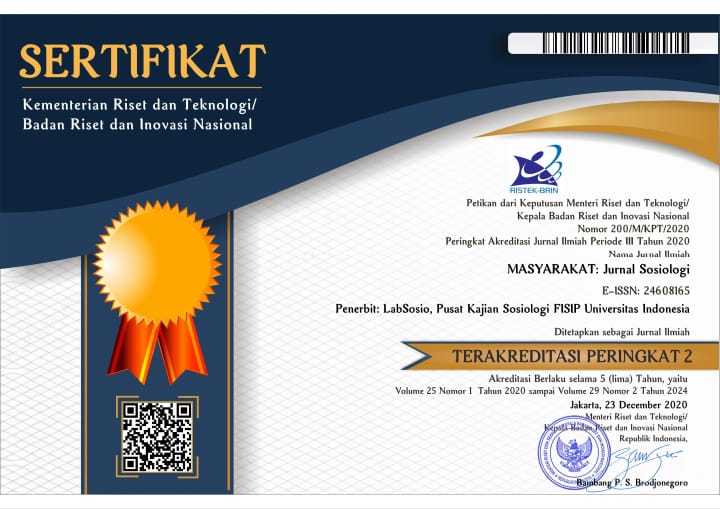Abstract
Abstract
Latour removes the boundaries between natural sciences and humanities. Science for Latour is cultural practise, at the same time in every cultural practice, nature and objects are also actively involved. In that sense, Latour's constructivism encourages the emergence of non-human actors as drivers of the societal changes. By that, he provoked sociology to expand its subject matter. The Social in sociology must be seen as an association involving human and non-human actors.
Key words: Constructivism, Expansion of agency, actant, actor network theory.
Bahasa Abstract
Abstrak
Latour menghapuskan batas-batas antara ilmu alam dan ilmu-ilmu humaniora. Sains bagi Latour adalah kerja kebudayaan, di saat yang sama dalam setiap praktek kebudayaan , alam dan benda-benda juga terlibat secara aktif. Dengan itu, konstruktivisme Latour mendorong tampilnya aktor-aktor non manusia sebagai penggerak jaman. Dengan itu ia memprovokasi sosiologi untuk mengubah subject matternya. Yang Sosial dalam sosiologi mesti dipandang sebagai asosiasi yang melibatkan aktor-aktor manusia dan non-manusia.
Kata kunci: Konsruktivisme, Perluasan keagenan, aktan, actor network theory.
References
References
Beck, Ulrich. 1992. Risk Society: Towards a New Modernity. United Kingdom: Sage Publications (CA).
Bhaskar, Roy. 2008. A Realist Theory of Science 1st Edition. London: Routledge.
Callón, Michel. 1998. Actor-network theory: the market test. In Law J, Hassard J. (eds) Actor network and after. Blackwell, Oxford.
Conty, Arianne F. 2018. “The Politics of Nature: New Materialist Responses to the Anthropocene.” Theory, Culture & Society 35 (7–8): 73–96. https://doi.org/10.1177/0263276418802891.
Çüçen, A. Kadir. 1998. Heidegger’s Reading of Descartes’ Dualism. The Paideia Archive: Twentieth World Congress of Philosophy.
Descartes, René, 1986. Discourse on Method. New York: London: Macmillan; Collier Macmillan.
Durkheim, Emile. 1895/1982. The rules of the sociological method. New York: The Free Press.
Durkheim, Emile. 2005. Suicide: A Study in Sociology. translated by J. A. Spaulding and G. Simpson. London: Routledge.
Foster, John B. “Nature as A Mode of Accumulation”. Retrieved October 5, 2023 (https://monthlyreview.org/2022/03/01/nature-as-a-mode-of-accumulation-capitalism-and-the-financialization-of-the-earth/).
Giddens, Anthony. 1979. Central Problems in Social Theory, pp. 5. London: Pelgrave: MacMillan.
Goldman, Alvin I. 1999. Knowledge In a Social World. New York: Oxford University Press. Hal: 13. https://doi.org/10.1093/0198238207.001.0001.
H.H Gerth dan C. Wright Mills (penerjemah dan editor). 1946. From Max Weber: Essays in Sociology, pp.129-156, New York: Oxford University Press.
Harman, Graham. 2014. Bruno Latour: Reassembling the Political (Modern European Thinkers). London: Pluto Press.
Horkheimer, Max dan Adorno, Theodor. 2002. The Dialectic of Enlightenment. Stanford: Stanford University Press.
Kelly, Stewart E. 2011. Truth Considered and Applied. [edition unavailable]. B&H Publishing Group. Retrieved October 15, 2022 (https://www.perlego.com/book/2694254/truth-considered-and-applied-examining-postmodernism-history-and-christian-faith-pdf).
Kennedy, Duncan. 2010. "Knowledge and the Political: Bruno Latour's Political Epistemology." Cultural Critique, vol. 74, 2010, p. 83-97. Project MUSE, https://doi.org/10.1353/cul.0.0067.
Kuhn, Thomas S. 2012. The Structure of Scientific Revolutions. 50th anniversary. Ian Hacking (intro.) (4th ed.). University of Chicago Press.
Kusch, Martin. 1995. “Bruno Latour, We Have Never Been Modern.” translated by Catherine Porter. Hemel Hempstead: Harvester Wheatsheaf, 1993. Pp. x 157. ISBN 0-7450-0682-X. £13.95. The British Journal for the History of Science, 28(1), 125-126. doi:10.1017/S0007087400032908.
Lash, Scott. 1999. Another Modernity, A Different Rationality. Oxford, pp. 312-338.
Latour, Bruno and Steve Woolgar. 1986. Laboratory life: the construction of scientific facts. Princeton, New Jersey: Princeton University Press. Hal: 129
Latour, Bruno. 1988. The Pasteurization of France. Cambridge: Harvard University Press.
Latour, Bruno. 1992. “Where are the missing masses? The sociology of a few mundane artifacts.”’ in W. E. Bijker (ed.), Shaping technology/building society: Studies in sociotechnical change, MIT Press, Cambridge, MA, pp. 225–258.
Latour, Bruno. 1993. We have never been modern. Harvard University Press.
Latour, Bruno. 1996a. “On actor-network theory: A few clarifications.” Soziale Welt, 47(4), 369–381. http://www.jstor.org/stable/40878163.
Latour, Bruno. 1999b. Pandora’s Hope: Essays on the Reality of Science Studies. Cambridge, MA: Harvard University Press.
Latour, Bruno. 2007. Reassembling the Social: An Introduction to Actor-Network-Theory. Oxford: Oxford University Press.
Latour, Bruno and Catherine Porter. 2004. Politics of Nature. Harvard University Press. https://doi.org/10.2307/j.ctv1bzfprt.
Latour, Bruno and Couze Venn. 2002. “Morality and technology.” Theory, Culture & Society. Vol. 19(5/6), pp. 247–260. SAGE, London: Thousand Oaks and New Delhi.
Latour, Bruno. 1988. The Pasteurization of France. Harvard: Harvard University Press.
Latour, B. 2014. Agency at the Time of the Anthropocene. New Literary History 45(1), 1-18. https://doi.org/10.1353/nlh.2014.0003.
Latour, Bruno. 2017a. Facing Gaia. 2017. Cambridge: Polity Press.
Latour, B. 2017. “Anthropology at the Time of the Anthropocene: A Personal View of What Is to Be Studied”. In: Brightman, M., Lewis, J. (eds) The Anthropology of Sustainability. Palgrave Studies in Anthropology of Sustainability. Palgrave Macmillan, New York. https://doi.org/10.1057/978-1-137-56636-2_2.
Lindemann, Gesa. 2011. “On Latour's Social Theory and Theory of Society, and His Contribution to Saving the World.” Springger: Human Studies. Spring Vol. 34, No. 1, pp. 93-110.
Karl Marx, Karl. 1972. The Karl Marx Library, vol. 1, ed. Saul K. Padover (McGraw Hill: New York. pp. 245–46.
Mahaswa, Rangga Kala. 2023. “Bruno Latour and Actor-Network-Anthropocene”. International Journal for the Historiography of Science, vol (14): 1-13 – https://orcid.org/0000-0001-9823-5884.
Muniesa, Fabian. 2015. "Actor-Network Theory", in James D. Wright (Ed.), The International Encyclopedia of Social and Behavioral Sciences, 2nd Edition, Oxford, Elsevier: Vol. 1, 80-84
Oakes, Guy. 1977. “The Verstehen Thesis and the Foundations of Max Weber’s Methodology.” History and Theory, Vol 16(1), pp. 11–29. https://doi.org/10.2307/2504575
Ritzer, George. 2014. Essentials of Sociology. USA: SAGE Publications.
Schaffer, Jonathan. 2009. “Spacetime the one substance”. Philosophical Studies 145 (1):131 – 148.
Sherman, H. 1981. “Marx and Determinism”. Journal of Economic Issues, 15(1), 61–71. http://www.jstor.org/stable/4224996.
Swindal, Jhon. 2012. “Marx on Nature.” Frontiers Philosophy of China, Vol 9. No 3. September 2012.
Weber, Max. 1977. Economy and Society. Guenther Roth and Claus Wittich, Eds.) Berkeley: University of California Press.
Recommended Citation
Robet, Robertus and R, U. Abdul Rozak
(2023)
"Bruno Latour's Constructivism and Its Implications for the New Agency of Sociology,"
Masyarakat: Jurnal Sosiologi: Vol. 28:
No.
2, Article 2.
DOI: 10.7454/MJS.v28i2.13564
Available at:
https://scholarhub.ui.ac.id/mjs/vol28/iss2/2


